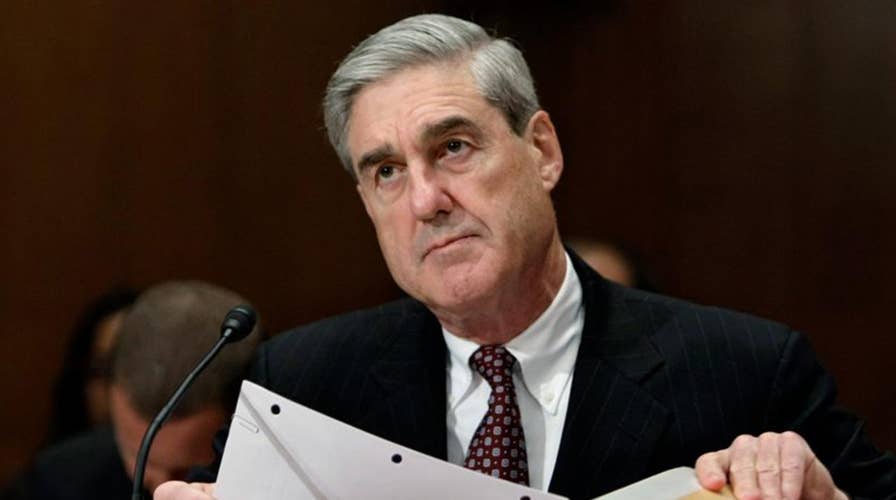Is it time for Mueller to wrap up his investigation?
Rudy Giuliani says he will not let the president sit down with the special counsel without first seeing the FBI documents. Former U.S. attorney Joe diGenova speaks out on 'Watters' World.'
It’s been more than a year since Robert Mueller was appointed special counsel to oversee the investigation into whether Donald Trump’s presidential campaign colluded with Russia in the 2016 election.
Mueller was tasked with overseeing the Russia investigation, including any links between the Russian government and people associated with Trump’s campaign.
Trump repeatedly has called the investigation a “witch hunt” and insisted there’s been “no collusion.” He’s also called the appointment of Mueller, which came after Attorney General Jeff Sessions recused himself from the case, “unconstitutional.”
The terms special counsel, special prosecutor and independent counsel are largely the same, though there are distinctions in how each is appointed.
Read on for a timeline of other notable special counsel appointments in American history.
Plame affair; 2003
Special prosecutor Patrick Fitzgerald was appointed to investigate the leak of CIA operative Valerie Plame’s identity. He was appointed by James Comey, then deputy attorney general, after Attorney General John Ashcroft recused himself from the probe.
Before his appointment, Fitzgerald was an assistant U.S. attorney in New York who prosecuted terrorism cases in the 1998 bombings of U.S. embassies in Kenya and Tanzania and the 1993 World Trade Center bombing, The Washington Post reported. He also was the first lawyer who built a criminal indictment against Usama bin Laden, according to the newspaper.
SCOOTER LIBBY PARDONED IN CIA LEAK CASE
In more recent times, Fitzgerald reportedly was under consideration to become a special prosecutor tasked with investigating former Secretary of State Hillary Clinton’s private email server.
Whitewater scandal; 1994
Robert B. Fiske Jr. originally was appointed as special counsel by Attorney General Janet Reno, who served in the Clinton administration, to investigate misconduct pertaining to the Whitewater Development Corporation, a failed real estate venture headed by President Bill Clinton and Hillary Clinton, along with James and Susan McDougal. The probe also included the death of deputy White House counsel Vincent W. Foster Jr., which was ruled a suicide.
As special counsel, Fiske led the questioning of the Clintons, The New York Times reported in 1994. The newspaper described the event as an “extraordinary” move as it was the first time a sitting president provided a sworn deposition about his conduct.
That same year, Fiske was ousted, and former solicitor general Kenneth Starr was appointed special counsel by a panel of judges. They said they removed Fiske so that he'd “be protected against perceptions of conflict.” Starr’s investigation ultimately led to the impeachment of Clinton as it encompassed the Monica Lewinsky scandal.
By 1999, Starr was replaced with veteran prosecutor Robert Ray.
Ray closed the investigation in 2000, officially clearing the Clintons of any wrongdoing in the failed Whitewater project.
Iran-contra affair; 1986
Appointed by a panel of judges, independent counsel Lawrence Walsh was tasked with investigating alleged misdeeds by the Reagan administration in the sale of weapons to Iran to fund resources and weapons for U.S.-backed rebels in Nicaragua.
After seven years, Walsh cleared President Ronald Reagan and his administration of criminal wrongdoing in the sale of the weapons, The New York Times reported in 1994. However, Walsh said he found Reagan had “knowingly participated or at least acquiesced” in a cover-up of a scandal.
EXPLAINED: SPECIAL COUNSEL ROBERT MUELLER’S INVESTIGATION INTO TRUMP, RUSSIA
In all, Walsh charged 14 people with crimes, mostly related to trying to withhold or hide information from Congress. The paper reported that 11 people pleaded guilty or were convicted.
Watergate scandal; 1973
Archibald Cox was appointed special prosecutor to lead the Watergate investigation in 1973. Cox tried to force the White House to turn over then-President Richard Nixon's taped Oval Office conversations.
In what became known as the “Saturday Night Massacre,” Cox was dismissed from his post later that year. Attorney General Elliot Richardson and Deputy Attorney General William Ruckelshaus already had resigned in protest after Nixon ordered them to fire Cox.
Nixon resigned in 1974 while facing impeachment.
Federal government conspiracy allegations; 1952
Officially dubbed "special assistant attorney general," Newbold Morris was appointed by then-Attorney General J. Howard McGrath as special prosecutor, tasked with “cleaning out corruption in the federal government,” it was reported at the time. Specifically, Morris investigated a reported conspiracy among Justice Department and Bureau of Internal Revenue officials who allegedly were fixing tax cases and accepting illegal payments.
Morris sent special questionnaires to most federal administrative employees and requested McGrath’s personal financial records and notes, according to The Atlantic.
McGrath ultimately fired Morris before he resigned from his Cabinet position.













































